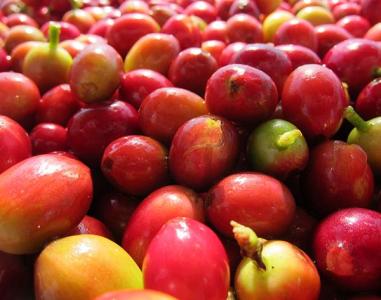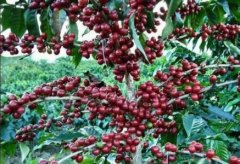Alishan Mazu-A brief introduction to the history and culture of the origin and development of Taiwan's boutique coffee

There are typhoons in Taiwan every year, and the roots of coffee trees generally do not go very deep into the soil. Once they encounter a strong typhoon, they will fall down. Putting betel nuts in the coffee garden can not only protect them from the shade, but also block the wind. The flowers of the coffee are on the top, while the bottom is fruitful because of the uneven sunshine. Because the bottom is exposed to sunlight and receives a higher temperature of the soil, it blossoms earlier and bears fruit earlier. The lower part of the plant blossoms and bears fruit later because of the strong wind and the lower temperature. Unlike tropical Southeast Asian and African countries, coffee trees in Taiwan have uniform crown and bottom temperatures and can blossom and bear fruit at the same time. The ripening time of the fruits on coffee trees in Taiwan is uneven, and they can only be picked one by one, so coffee farmers work hard to pick beans when picking coffee, and they can only pick ripe fruits first, and then pick them after a few days, which wastes a lot of time for coffee farmers. on the other hand, the coffee of one tree blossoms at different times, bears fruit at different times, and is picked at different times, which makes the aroma of Alishan coffee particularly rich. [3]
The output of coffee beans in Taiwan is small, but through the careful planting of farmers, high-quality coffee beans can be harvested. Coffee trees, including Alishan, Nantou, Yunlin, and other places have very unique coffee. Alishan coffee is planted by young people of the Alishan Zou people who return to their hometown. The annual output has reached 20 tons, supplying instant coffee and filter coffee.
Taiwan's coffee is very famous. The history of Taiwan coffee can be traced back to 1624. In the early days, the Dutch introduced coffee, but it was limited to Dutch internal drinking, so it could not be widely popularized. During the Japanese occupation in 1931, at that time, for the sake of their own needs and for the sake of Taiwan coffee, the Japanese invaders vigorously mobilized farmers to grow coffee, so many farmers lost fertile fields for growing rice. Although the coffee grown has a bumper harvest year after year, but the coffee has no profit and has lost its food, many coffee farmers have not been able to feed themselves by working all their lives. Mr. Kimura grows and cultivates in large quantities in the areas of Alishan, Nantou and Yunlin in northern Tainan.
In 1941 (the 16th year of Rizhaohe), most of the raw beans were shipped back to Japan. The coffee planting area in Taiwan has reached 75 hectares, and in its heyday it was known as "the largest coffee factory in the far East". In 1945 (Rizhaohe 20 years), the area of coffee cultivation in Taiwan expanded to 113 hectares after the war. After the surrender of Japan, Taiwan was restored, and the national government strongly advocated the reclamation of fertile land and the cultivation of cash crops. The aborigines of Alishan even wanted to use the countryside or mountains to grow some food to feed their stomachs. No one wanted to grow coffee that tasted as bitter as life, so Taiwan coffee gradually declined and was gradually forgotten by people. In 2000 (1989), it was not until the propaganda of the Taiwan government and the strong support of the Chiayi county government that local farmers began to grow coffee again. Taiwan coffee gradually revived and developed well in recent years, and was deeply loved by more people.
Alishan Mazu coffee, the best instant coffee. It belongs to the high-quality instant coffee, which is produced in Alishan, Chiayi County, Taiwan Province. Adhere to the manual strict contestants to pick, draw mountain spring water fermentation, after the full sun made of alpine coffee beans.
Alishan Mazu Taiwan coffee beans are strictly grown in the mountain areas of Alishan between 800m and 1300 m above sea level, belonging to Arabica beans.
Mafeel is a language taken from the Zou people of the Alpine nationality in Alishan, which means "delicious and delicious". Mafeel coffee ranks first in Asia and eighth in the world.
Alishan Mountain is a branch of the Yushan Mountains, which spans Nantou and Chiayi counties. It is located more than 2000 meters above sea level, with coordinates of 23 degrees 31 minutes north latitude and 120 degrees 48 minutes east longitude. It faces the Yushan Mountains in the east and is surrounded by high mountains. The climate is cool, with an average temperature of 10.6 degrees Celsius in summer and 6.4 degrees in winter. The air in the Great Ali Mountain area is fresh all year round, there is no pollution, the climate is humid, and it is foggy and rainy all the year round, because the special gas of Alishan not only sends out good tea every year, but also is very suitable for growing coffee, and the baked coffee is also very good. Alishan in Taiwan has a superior geographical environment and climate. In terms of uniqueness, Taitung District belongs to coastal type, the coffee produced is close to Mocha, Pingtung District belongs to high prototype, the coffee in this area is close to Ethiopia, the Ali Mountains belong to mountain type, and the grown coffee is like Central and South America. It has the characteristics of flowers and grass, the taste of drinking is not bitter and astringent, and the flavor is mellow. In particular, it is pointed out that Taiwan has a superior geographical environment and climate, which is most suitable for the development of fine coffee.
Alishan Mazu Taiwan coffee is most suitable for cooking in siphon coffee pots and is very suitable for individual consumption. No sugar, no cream is also very smooth. In addition, fancy coffee can also be made, but it is recommended that the amount of coffee is slightly low at this time, and you can taste its sweet, pure and thick taste. And roasted coffee beans, it is easy to come into contact with the air to make the smell worse, at this time the ideal coat packaging is very important. The Alishan Mazu Taiwan coffee raw beans are packed with aluminum foil with an one-way breathable valve, which can discharge the carbon dioxide produced during the ripening process of the coffee beans, and the air outside the bag cannot enter. The opaque aluminum foil bag on the package can also prevent moisture from entering and keep fresh coffee beans breathing, but it will not affect the quality and flavor of coffee beans because of exposure to air and moisture. However, the coffee tree brought by the Dutch to Alishan was gradually abandoned in the process of continuous migration. it was not until Gu Keng Coffee and Starbucks Coffee brought the popularity of coffee in Taiwan market in recent years that coffee made this bitter-sweet magic bean. To be reborn on Mount Ali. The people believe that the coffee tree found in the secret land of the mountains is what the people called ruthless mafeel (Zou language) hundreds of years ago, and it is a rare historical witness for the people to find these coffee trees so far, and evoke the memories of the Alishan people hundreds of years ago. The tip of the picky tongue has also succumbed to the Alishan Mazu Mafeel coffee on the world stage. in recent years, driven by the government's development of sightseeing agriculture and local industry, Alishan Zou aboriginal youth are willing to return to their hometown to operate and cultivate. Alishan coffee has been full of vitality again, coupled with the popularity of coffee, the demand for coffee at home and abroad is increasing year by year, more and more friends know how to taste coffee and love coffee, and they are more picky about the taste. Therefore, high-quality coffee can also satisfy the taste buds of the Chinese people, resulting in a situation in which Taiwan coffee is in short supply. Zheng Chenggong defeated the Dutch in 1662, ending the 38-year Dutch rule, and most of the Dutch returned to the Netherlands. however, some Dutch choose to stay with their wives and relatives to accept the protection of the aborigines. In the later period, Zheng Chenggong introduced a large number of Han Chinese to Taiwan for land reclamation, but squeezed the living space of the Zou nationality, and the Zou people had to gradually move from the flat land to the mountainous areas. these remaining Dutch migrated with the Zou people, and finally settled in the lalauya tribe of Alishan, so the Dutch integrated into the Alishan Zou tribe. Up to now, especially in the Leye tribe and some clans, we can see that the Alishan Mafeel, a clan that looks like foreigners, is planted in the Alishan Mountains, which is uniquely located in the global coffee belt. Due to the high altitude of the mountains and the temperature difference of more than 10 degrees between day and night, the coffee beans produced are of the best quality, with full grains, thick pulp and sweet taste. Sweet, not astringent, not bitter, not sour, perfectly presents the taste of coffee, for the best quality, the most unique flavor, "Zhenggang" native flavor of Taiwan's Alishan Mafeel coffee is taken from the language of the Zou people of the Alishan nationality, which means "delicious". Alishan is the area where coffee is grown, while Alishan coffee is grown by the Zou people, and it is also named Mafeel. The coffee grown belongs to Taiwan coffee. Due to the low production of Alishan Mafeel coffee in Taiwan, Alishan Mazu coffee belongs to alpine coffee and belongs to the high-quality boutique coffee in Taiwan. Alpine Coffee, which ranks first in Asia, ranks eighth in the world. Coffee trees are mainly planted in southern Taiwan, such as Alishan in Chiayi County, Taiwan. because of its high altitude, Alishan is not only suitable for growing tea, but also more suitable for growing coffee. It belongs to the fine coffee in coffee.
The varieties of Alishan coffee are grown in Arabica. This kind of coffee grows in a harsh environment. Taiwan is located in the subtropics. The temperature is higher all the year round, and coffee trees like shade. If coffee trees are planted alone, they may be killed by the strong sun. The Ali Mountains are covered with forests and there are many betel nut trees, so most of his coffee trees are planted in the betel nut garden, because the betel nut trees grow fast and have luxuriant branches and leaves. It can not only absorb the sun but also get shade early, which is very suitable for the growth of coffee. In the coffee garden where Ali Mountain went, the coffee trees are all hidden in the shade of the betel nut trees. Coffee trees are also very strong, and the coffee produced is relatively good. Coffee trees are planted and coffee plants emit different fragrances and tastes depending on where they are planted, and they are still coffee varieties with great personality. Alishan coffee in Taiwan has become very popular in recent years.
Important Notice :
前街咖啡 FrontStreet Coffee has moved to new addredd:
FrontStreet Coffee Address: 315,Donghua East Road,GuangZhou
Tel:020 38364473
- Prev

A brief introduction to the description of flavor, taste and aroma characteristics of Alishan Mazu boutique coffee
Alishan Mafeel is planted in the Alishan Mountains, and the Alishan Mountains are uniquely located in the global coffee belt. Because of the high altitude and the temperature difference of more than 10 degrees between day and night, the coffee beans produced are of the best quality, with full grains, thick pulp, sweet and mellow taste, sweet, non-astringent, not bitter, not sour, and perfectly showing the taste of coffee.
- Next

A brief introduction to the Market Price of Mahi Fine Coffee varieties in Alishan, Taiwan
Alishan Mafeel is planted in the Alishan Mountains, and the Alishan Mountains are uniquely located in the global coffee belt. Because of the high altitude and the temperature difference of more than 10 degrees between day and night, the coffee beans produced are of the best quality, with full grains, thick pulp, sweet and mellow taste, sweet, non-astringent, not bitter, not sour, and perfectly showing the taste of coffee.
Related
- Detailed explanation of Jadeite planting Land in Panamanian Jadeite Manor introduction to the grading system of Jadeite competitive bidding, Red bid, Green bid and Rose Summer
- Story of Coffee planting in Brenka region of Costa Rica Stonehenge Manor anaerobic heavy honey treatment of flavor mouth
- What's on the barrel of Blue Mountain Coffee beans?
- Can American coffee also pull flowers? How to use hot American style to pull out a good-looking pattern?
- Can you make a cold extract with coffee beans? What is the right proportion for cold-extracted coffee formula?
- Indonesian PWN Gold Mandrine Coffee Origin Features Flavor How to Chong? Mandolin coffee is American.
- A brief introduction to the flavor characteristics of Brazilian yellow bourbon coffee beans
- What is the effect of different water quality on the flavor of cold-extracted coffee? What kind of water is best for brewing coffee?
- Why do you think of Rose Summer whenever you mention Panamanian coffee?
- Introduction to the characteristics of authentic blue mountain coffee bean producing areas? What is the CIB Coffee Authority in Jamaica?

